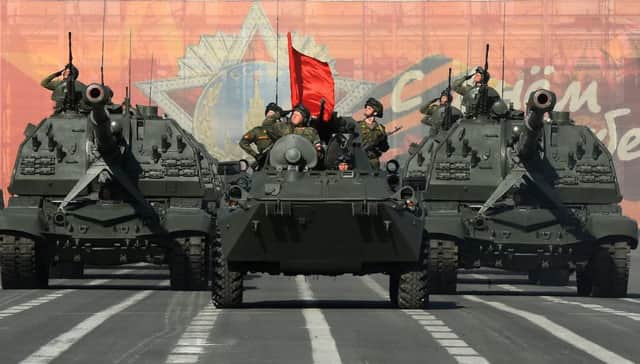Arms race fears after Trump pulls US from nuclear pact with Russia


The US and Russia yesterday walked away from the Intermediate-range Nuclear Forces (INF) treaty, which saw more than 2,700 short- and medium-range missiles destroyed in the first four years after it was signed in 1987.
If they choose not to extend or replace the larger New Start treaty when it expires in early 2021, there will be no legally binding limits regulating the world’s two largest nuclear arsenals for the first time in nearly a half century.
Advertisement
Hide AdAdvertisement
Hide AdThe US blames Russia for the demise of the treaty, saying that for years Moscow has been developing and fielding weapons that violate the treaty and threaten the US and its allies, particularly those in Europe.
But without the constraints of the treaty, the Trump administration says it can now counter Russia – and China. The US has complained for years of an unfair playing field – that Russia was developing weapons that violated the treaty and China, which was not a signatory, was developing similar weapons.
President Donald Trump has not committed to extending or replacing New Start, which imposed limits starting in 2018 on the number of US and Russian long-range nuclear warheads and launchers.
Mr Trump has called New Start “just another bad deal” made by the Obama administration, and his national security adviser John Bolton said in June that the administration was unlikely to agree to extend the treaty for five years, which could be done without legislative action in either capital.
The Trump administration thinks talks about extending New Start are premature. The administration claims that, with China’s growing arsenal of nuclear warheads, Beijing can no longer be excluded from nuclear arms control agreements. Mr Trump has expressed a desire to negotiate a trilateral arms control deal signed by the US, Russia and China.
“We’ll see what happens,” he said at the White House on Thursday. “I will say Russia would like to do something on a nuclear treaty and that’s OK with me. They’d like to do something and so would I.”
German foreign minister Heiko Maas said this week that the collapse of the treaty means some security in Europe is being lost.
“We regret the fact that Russia has not done what was necessary to save the INF treaty,” he said.
Advertisement
Hide AdAdvertisement
Hide Ad“Now we call all the more on Russia and the US to preserve the New Start treaty as a cornerstone of worldwide arms control.
“Nuclear powers such as China must also face up to their responsibility on arms control – they have more weight in the world than at the time of the Cold War.”
UN secretary-general Antonio Guterres said the INF treaty “is a landmark agreement that helped stabilise Europe and end the Cold War” and its end “will likely heighten, not reduce, the threat posed by ballistic missiles”.
He urged the two nations “to avoid destabilising developments” and agree on a new arms control path, beginning with the extension of the New Start treaty.
Analysts fear that the collapse of the historic agreement could lead to a new three-way arms race between the US, Russia and China.
Nato secretary-general Jens Stoltenberg said the transatlantic alliance would “respond in a measured and responsible way to the significant risks posed by the Russian 9M729 missile to allied security”.
However, he said Nato “does not want a new arms race” and confirmed there were no plans for the alliance to deploy land-based nuclear missiles of its own in Europe.